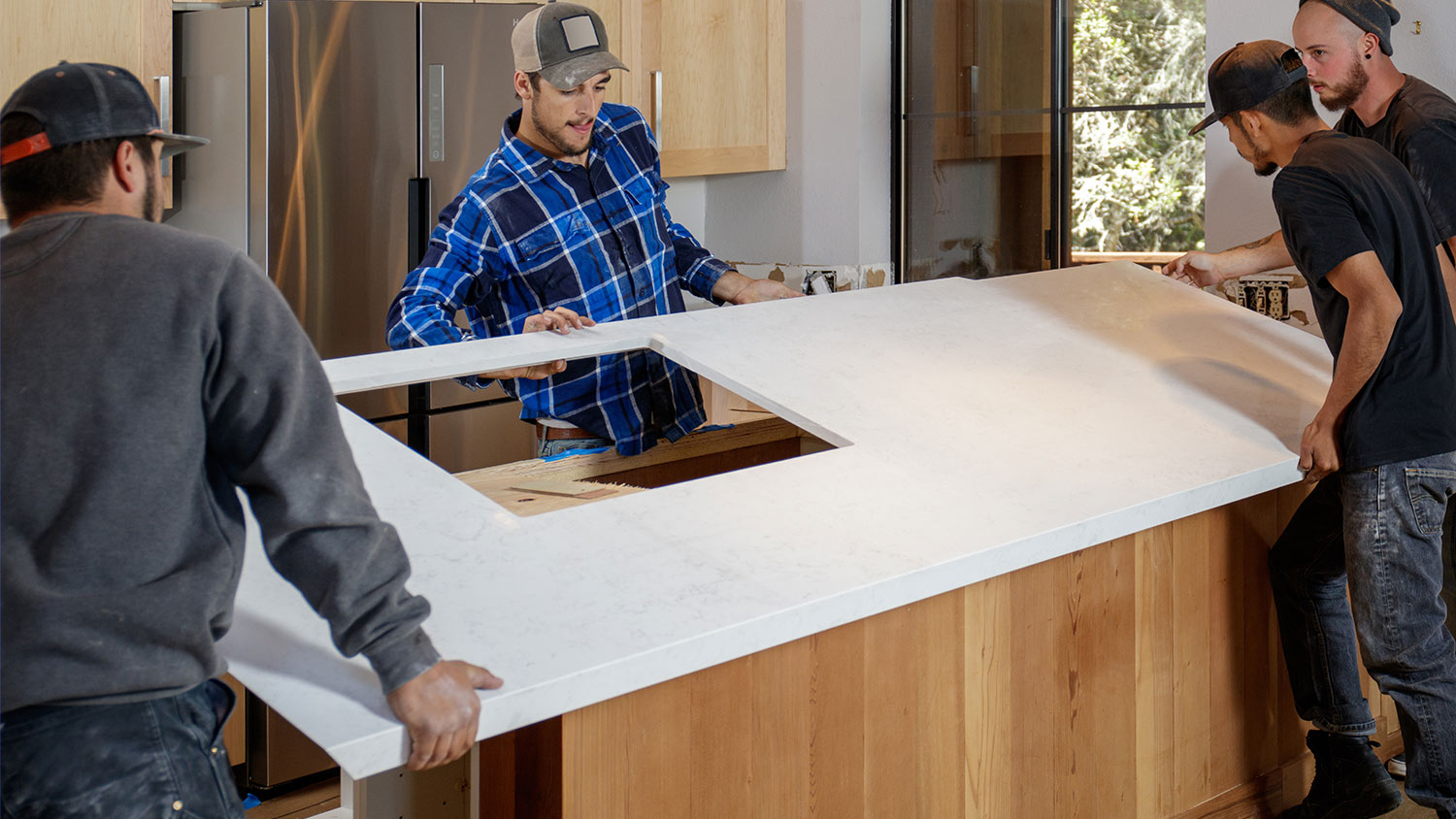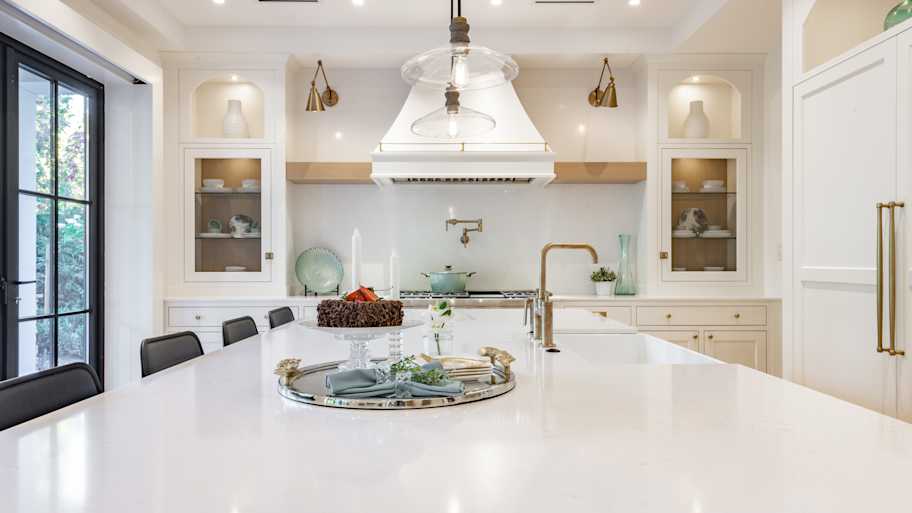
Explore how much concrete countertops cost to install based on factors like their size, thickness, location, finish, and labor rates.
Corian® is a more affordable surface than natural stone, but just as pretty


Corian® is an affordable solid surface countertop that is scratch- and stain-resistant.
These countertops are seamless, providing endless beauty to your kitchen.
Corian® is not heat resistant, which can be a downside.
Corian® countertops cost an average of $26 to $65 per square foot.
If you are wondering what Corian® countertops are, you will find all your answers here. Corian® is a solid surface countertop that is stain- and scratch-resistant. While it is less expensive than marble or quartz, it offers a beautiful upgrade to any kitchen while providing a highly functional and family-friendly countertop.
Corian® is known as a “solid surface” material made with polymer and natural minerals. It is often used for countertops and, occasionally, for bathroom basins and surfaces, outdoor spaces, and some commercial uses. In 1971, chemical company DuPont introduced Corian® Solid Surface to the market. The engineered stone material is made by blending acrylic polymers with natural minerals and stone-derived materials, and then molding the substance into shapes.
After DuPont lost its patent on solid surface countertops, several companies introduced their own versions under different brand names, including Avonite® and Wilsonart®.
Although Corian® refers only to the DuPont brand name of solid surface countertops, many use the term more broadly to denote all solid surface countertops. That said, it tends to be the most highly regarded (and pricey!) of the competing brands. If you choose this type of countertop, know that Corian® surfaces can only be fabricated and installed by DuPont-certified Corian® countertop installers near you.
When taking on this project, expect questions only a pro can answer. With our network of local pros, you'll get the job done and your questions answered—without the hassle and stress of doing it yourself.
Corian® countertops (like any other material) have both pros and cons to consider. Comparing the good and bad sides of any countertop can help you determine which works best for your household’s needs.
| Pros of Corian Countertops | Cons of Corian Countertops |
|---|---|
| Stain- and crack-resistant | Not heat-resistant |
| Seamless | Does not add to your home’s resale value |
| Less expensive than natural stone |

Corian® countertops have many benefits, especially the fact that they are nonporous, making them resistant to stains.
When compared to (more affordable and softer) laminate, Corian® is the more durable option. Because it is nonporous and consistent in composition, Corian® is also more stain- and crack-resistant than natural stone. Plus, solid surface countertops are relatively easy to repair. If the surface gets scratched, scorched, or stained, you can restore it with abrasive scrubbing or sanding.
Although many consider quartz and natural stone to be the most attractive surface materials, Corian® is hard to beat on the appearance front. Its seams are virtually invisible, thanks to epoxy blended to match the countertop colors. Although Corian® always used to go hand-in-hand with a neutral, speckled look, it now comes in more than 100 colors and designs, some resembling stone.
For an ultra-seamless look, you can order an integrated Corian® sink, drainboard, or backsplash.
Bonus: Opt for the “Charging Surface” feature, a unique add-on that lets you literally charge devices on the countertop.
Corian® countertops cost less than quartz or natural stone. Without labor, Corian® starts at $40 per square foot. In comparison, marble countertops cost up to $100 per square foot, and granite countertops can cost $60 per square foot. But keep in mind that a complex configuration and intricate design details can increase these countertops’ prices.

While there are many benefits to installing Corian® in your kitchen, there are a few drawbacks to consider.
Corian® is not as resistant to heat as granite or quartz, so do not put hot pots directly on the surface. Solid surface countertops are also softer than quartz or natural stone, meaning they are relatively easy to scratch or dent.
Although installing Corian® is less harsh on your wallet than, say, marble, it may not lure potential homebuyers as much as true quartz or natural stone. So, you might not recoup as much of your initial investment when it comes time to sell.
While Corian® countertops are considered more valuable than laminate, they still rank lower than the highly desired natural stone countertops, such as quartz. They are less durable and not as aesthetically pleasing, leading to a lower increase in your resale value.
On average, Corian® countertops cost $26 to $65 per square foot. With installation, they can cost $2,200 to $5,000. The actual cost of the materials depends on the type of countertop you choose. Corian® is the brand name, but prices vary based on the design and thickness chosen.
Another factor that affects price is the chosen finish. Matte finish is the least expensive, at $30 to $40 per square foot, and high gloss is the most expensive, at $60 to $80 per square foot. Finally, color plays a role; the lighter the color, the less it costs per square foot. Whites and grays cost $17 to $44 per square foot, and dark or bright colors cost $60 to $80 per square foot because of the work involved in coloring them.
Official Corian® countertops can only be fabricated and installed by DuPont-certified installers, so you cannot install them yourself.
However, installing other, non-exclusive solid surface countertops yourself could save a lot of money since labor is around $10 to $30 per square foot. Solid surface is one of the more DIY-friendly countertop materials, as it is lighter and easier to cut than stone. However, cutting solid surface counters can expose you to particulate matter that may damage your lungs. Only approach this project if you have experience with similar projects and are willing to take extensive safety precautions. If you damage your countertop, it could cost you more to replace or repair than you would pay a professional to install the countertop.

| Materials | Construction | Durability |
|---|---|---|
| Corian® | Polymers, natural minerals | Stain and crack-resistant |
| Laminate | Plastic bonded to particleboard | Not heat or scratch-resistant |
| Quartz | Resin and minerals | Scratch, chip, and water resistant |
| Granite or Marble | Natural stone | Heat and scratch-resistant |
Before you select a material, research the different countertops to find the best fit for your home.
Laminate countertops and other surfaces are made from layers of plastic bonded to particleboard or kraft paper. As a result, they are less durable than Corian® and chip easily. Partly for this reason, they are also less expensive than solid surface countertops.
As with Corian® and other solid surface countertops, quartz is a type of engineered stone. However, while solid surface countertops contain 33% binding resins (which are factory-made) and 66% minerals, quartz countertops are generally 10% resins with 90% minerals. That is why Corian® is more affordable, though less durable, than quartz countertops.
Granite and marble are both natural stones, so they are harder and more durable than Corian®, although they can crack. They are also generally considered more beautiful, though different Corian® designs mimic their look. Unfortunately, natural stone requires regular sealing and polishing, and marble can develop rust stains over time. Plus, granite and marble typically cost 10% to 20% more than Corian®.
As with anything, keeping your Corian® countertops looking beautiful and HGTV-worthy involves regular upkeep.
To prevent Corian® from melting or burning, use a trivet for hot pots and pans.
To guard against scratches, slice food on a cutting board.
For cleaning, wipe with a wet, soapy cloth or a pH-neutral cleanser, such as one designed for granite. Do not use window cleaners, which can leave a filmy residue.
To avoid spots and watermarks, dry completely.
Stay away from harsh chemicals and oven cleaners, which can degrade the finish.
If your Corian® countertop is looking the worse for wear, you can refinish it yourself by sanding and buffing the countertop with a Scotch-Brite™pad, though you should check the manufacturer’s website for detailed directions. If the scratches or damage are extensive, you may want to hire a local pro for countertop resurfacing.
From average costs to expert advice, get all the answers you need to get your job done.

Explore how much concrete countertops cost to install based on factors like their size, thickness, location, finish, and labor rates.

Discover cabinet installation cost estimates, including average prices, key cost factors, and tips to save on your new kitchen or bathroom cabinets.

Are you leaning towards solid surface countertops? If so, you've likely come across Corian®. Find out how much Corian® countertops cost so you can plan your project.

When it’s time for new countertops, this calculator will help you know how much countertop you need to complete your project.

Choose between five highly rated countertop materials for your next kitchen remodel, including granite, engineered quartz, butcher block, concrete, and laminate.

If your countertops are getting old, dull, or showing signs of wear, it may be time to do something. But to refinish vs. replace countertops is the question.